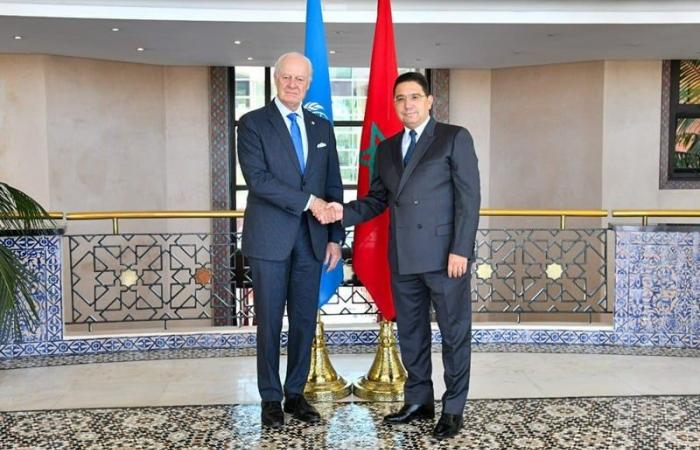In a clear and unambiguous statement, Mohamed Talib, expert in Sahara affairs and member of the Royal Advisory Council for Saharan Affairs (CORCAS), categorically rejected the proposal for partition of the Moroccan Sahara suggested by Staffan de Mistura, the personal envoy of the Secretary General of the UN.
This idea, already rejected by Morocco more than twenty years ago, was put back on the table in a context in which the UN is struggling to find a solution to the conflict. During a meeting in November 2001 in the United States, the idea initially suggested by Algiers was discussed between James Baker, then personal envoy of the UN Secretary General for Western Sahara, and former Algerian President Abdelaziz Bouteflika . Behind this suggestion, the Algerian objective could not be clearer: to obtain strategic access to the Atlantic Ocean while seeking to landlock Morocco, thus isolating it from its natural extension towards Africa.
« This proposed division of Western Sahara between a territory under Moroccan sovereignty and an independent entity on the borders of Mauritania is not only obsolete, but it is also unacceptable.“, insisted Mohamed Talib. For him, De Mistura’s initiative reflects a certain form of failure to achieve a truly innovative solution. “ Morocco rejected this idea two decades ago and our position has not changed: partition is not an option. The Kingdom will not give up an inch of its territory« .
By returning to this idea of partitioning Western Sahara, Staffan de Mistura seems to ignore Morocco’s firm and unwavering position. For the Kingdom, the question of territorial integrity is not negotiable, and any attempt to divide the Sahara into two entities amounts to weakening national unity. Mohamed Talib, in his statement, firmly recalled that “ The Sahara has always been an integral part of Morocco, long before colonization. This historical reality is anchored in our national identity« .
The path to lasting peace in Western Sahara certainly does not involve partitioning the territory. On the contrary, as Talib recalls, “ the unity and sovereignty of Morocco are non-negotiable, and any solution must be based on these fundamental principles“. It is now up to the international community to recognize this reality and push for a solution that allows for real and lasting peace, rather than clinging to obsolete and unworkable options.
De Mistura wants to resurrect an old proposal
De Mistura’s proposal, inspired by an old suggestion from James Baker, a former UN envoy, fired just two years later, is seen as an admission of weakness. According to Talib, bringing out such an option demonstrates that UN mediation struggles to create new perspectives and falls back on already outdated solutions. “ It is obvious that this idea only rekindles tensions and contributes nothing to lasting peace.”
For Mohamed Talib, the only reasonable outcome remains the autonomy plan proposed by Morocco in 2007, a project widely supported by the international community. “ Several countries have already expressed their support for this plan, which offers Sahrawis the opportunity to conduct their local affairs while preserving the unity and sovereignty of Morocco.“, he stressed.
He added that the autonomy plan remains the only viable negotiating framework, unlike the partition proposal which, according to him, would lead to an impasse. On the other hand, the partition proposal, largely outdated and without any favorable response, moreover, only shows that the UN is short of innovative ideas to break the current impasse.
In his statement, Mohamed Talib did not fail to criticize Mistura’s approach, considering that the UN lacks innovation to resolve the situation. “ As Moroccans, we can only note the lack of progress and the inability of the UN to propose new approaches. Returning to options that have already been rejected shows a form of disarray in the management of the file« .
This position also reflects the Kingdom’s determination not to make concessions on an issue as crucial as territorial integrity. “ Morocco has shown patience and goodwill by proposing a realistic and credible solution. It is time for other actors to recognize that the sovereignty of the Kingdom over the Sahara is non-negotiable« .
A prolonged impasse?
Faced with this proposal, Mohamed Talib is skeptical about the chances of achieving a rapid outcome. “ The UN must review its copy and understand that Morocco, supported by many countries, will not back down. The status quo cannot continue, but solutions such as partition will only inflame the conflict« .
To conclude, Talib reiterated Morocco’s commitment to a peaceful solution, but with full respect for its sovereignty. “ The Sahara is Moroccan and will remain so. If the UN really wants to contribute to peace, it must align itself with a viable and realistic solution, not with outdated and unacceptable ideas.« .
The current impasse is not attributable to Morocco. “ The Kingdom has always been open to negotiations, as long as they respect its territorial integrity.“, he recalled. But, faced with an inflexible Polisario and an Algeria which fuels the conflict from the shadows, the UN seems paralyzed in its ability to move the lines.






